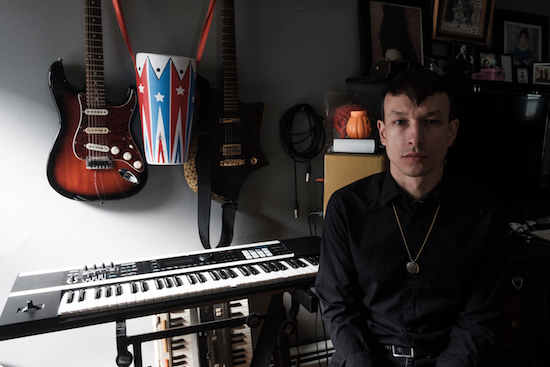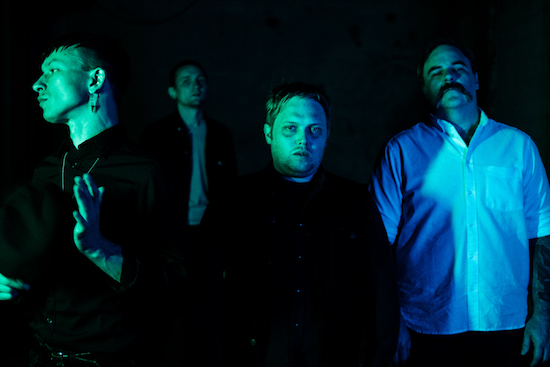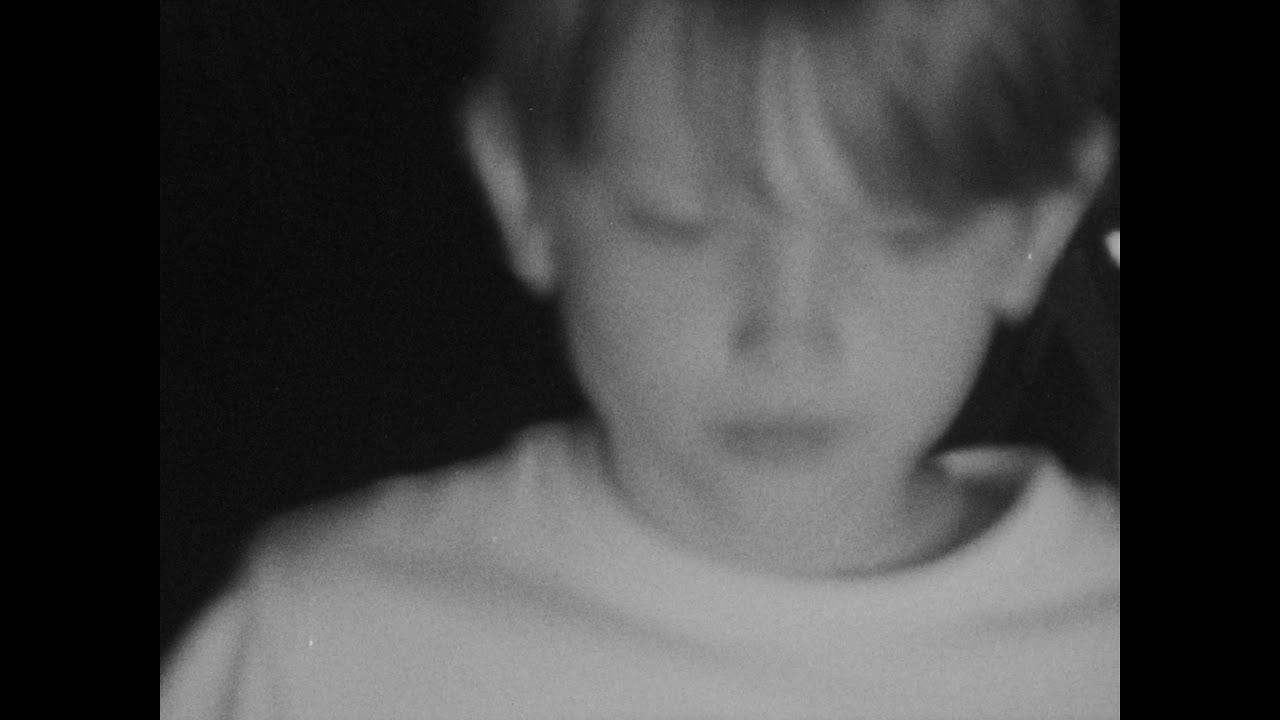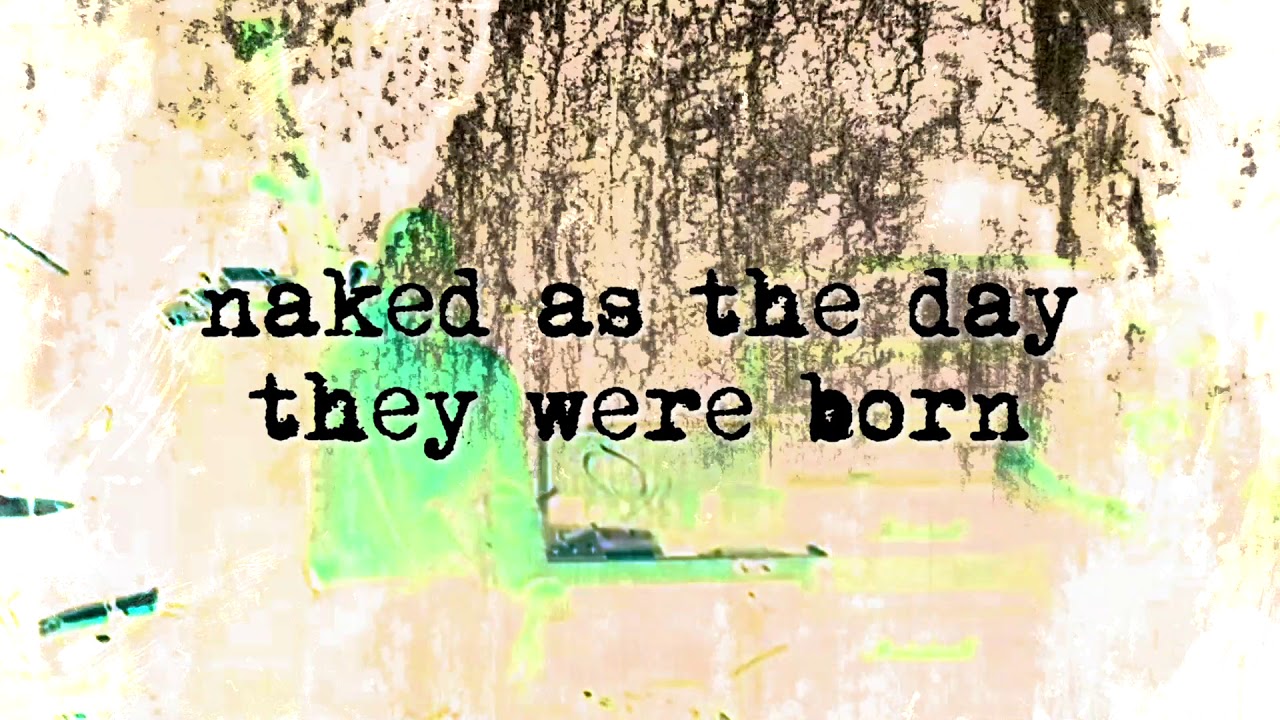Portraits by Reid Haithcock
Musicians are often excellent multi-taskers. Although, says science, what we describe when we use
the term ‘multi-tasking’ doesn’t actually exist. What we’re really talking about is task switching, or
the ability to hop neatly from job to job without getting stuck in too much cognitive traffic en route.
Recording albums or successfully getting through live performances calls for a musician’s
attention to be deployed in multiple directions. You’ve got to consider timings, textures, dynamics
and arrangement, not to mention the heady world of tonal maths, to get anywhere.
It should come as no surprise, then, that Alexis “Lex” Marshall, vocalist of the Providence, Rhode Island band Daughters, is such a natural at making threats while folding laundry. We speak over Skype, and it’s fairly early in the morning in central Pennsylvania when he takes my call. Getting some domestic tasks out of the way concurrently makes sense: two chores in half the time. We discuss the band’s new work first, and Marshall arrives at the topic of ‘The Reason They Hate Me’, a standout track from their latest album (and their first with Ipecac), You Won’t Get What You Want.
“Don’t tell me how to do my job!” the track sees Marshall chant over screeching guitars and
hurricane-force drumming. A cry against the rude customers, the overbearing managers, the
backseat drivers of the world? Not quite. ‘The Reason They Hate Me,’ says Marshall, is directed at
music journalists.
“They’ve somehow inserted themselves into the music community as though they’re ‘one of us’, as
in people who are being creative and putting music out there to be swallowed and digested. They
think their opinions are really fucking important. And they’re just pricks. And they don’t have the
gall — or the balls, for lack of a better word — to be creative because they know there are people
just as shitty as themselves who are gonna stomp all over it and they aren’t willing to do that.”
I respond that I’ve always wanted someone to write a song about me, and now feel that a lengthy
piece graphically shit-taking Marshall, his bandmates and their output seems like a fast-track to
that goal.
“Well, we’ll be in England soon,” he says diplomatically. “And Hemingway, when he got bad
reviews, would find the reviewer and go to their home and punch them.” I can’t see Lex over Skype,
but I know that he’s wearing a smirk (and possibly a nicely warmed shirt, fresh from the dryer).
Marshall, who formed Daughters with Brent Fantini, Nick Sadler and Samuel Walker in 2001, is
used to getting up close and personal with listeners. The band’s confrontational live shows, which
at times feature Lex enduring “people spitting in my mouth, punching me, grabbing me, trying to
pull my shirt off or whatever,” are exercises in tension-building and punishing release, the initially
suave and suited Marshall becoming increasingly dishevelled and frantic as the night progresses.
He’s a bit too wry and considered over the phone for me to really picture him getting into fistfights
with detractors (especially as a father of two) but the ferocity of his performances is no joke.
“Some people say they’re always nervous when they play. But I don’t feel nervous, really — I get
antsy. I want to just play. It’s why I don’t really like to go to shows that much. Whenever I see
people playing I get jealous and think ‘Well, I wanna play now.’ It’s very selfish.” He chuckles. “I see
other people performing and get inspired and immediately want to perform.”
“My brother had these old VHS tapes of Alice Cooper cutting his own head off and holding snakes
onstage and all the crazy theatrics — it was brilliant. I got older, and saw punk bands, Henry
Rollins and The Stooges. That was more interesting to me than anyone being a good singer. My
interest was in the energy and not really the sounds coming out of their mouths.”
On the press topic, I sense a wound. Daughters wouldn’t strike anybody as the kind of band that
cares about their press — from the early work, full of alarming speed-punk freakouts, to the latest
material, stately and harrowing, few listeners would immediately peg them as a group with critical
acclaim and popular appeal on their minds. But I can also understand that it mustn’t be fun to take
great care labouring over art for months only to have some obnoxious grad condemn it, bobbing
smugly on his or her office gym ball somewhere in New York.
“I never read a review and thought ‘Here’s a hell of a reviewer,’” Lex continues. “I never thought ‘I’d
better follow this guy.’”
Are we talking criticism in general here?
“Art criticism? Get the fuck out of here. How do you criticise art? It’s great for the critic. But they’re
not creating anything. They’re doing nothing of any real value. They’re just looking at what other
people have created and giving their opinion about it. That’s fucking meaningless.” I mumble
something about Susan Sontag and the tangible impacts strong writing can have on people’s lives.
Lex relents a little.
“Well, the song is about my personal experience with people who aren’t particularly interested in
conveying information. They’re just interested in their opinions of things, which I think is more
harmful than helpful. Observation and discussion is lacking in journalism. People are much more
interested in saying ‘These are my tastes. Here’s why this doesn’t fit in with my tastes and why it’s
not good enough and shouldn’t be good enough for anyone.’”
Whatever the case, critics are keen on the latest Daughters. It’s an intimidating listen, full of
shrieking glass, dented metal and lyrical brooding. I risk one last critical sally and tell Lex one of
my friends thinks the commanding, half-spoken vocal performances on You Won’t Get What You
Want sound like an evil Jonathan Richman. Surprisingly, this is met with approval.
“I’ll take that,” he laughs. “I like the Modern Lovers. That’s maybe my favourite comparison I’ve
had so far, actually.”
Writing the album, Lex says, couldn’t have happened without the internet. While he’s spooked by
pathological device-use (“I speak openly to all my friends about being excited to deprive my
children of things like phones”), the band relied on file-sharing platform Dropbox to help them
knock songs into shape as a unit, contributing digitally from their various respective home states.
That style of working — airing ideas in a group forum following individual tinkering — is one you’d
likely associate more with a hip hop collective than an established noise-prone rock band. But it
seemed to suit Daughters just fine.
“Nick [Sadler, guitars] was working on things endlessly and he would add regularly. ‘The Lord’s Song’ was one that Nick had finished, he felt, and he wasn’t paying any more attention to it. One day I was sitting on the toilet listening to the demos, singing along in my head. I immediately texted him saying I
wanted to go back to it.”
That song, the record’s pummelling midpoint, contains some of Marshall’s most emphatic vocals
along with allusions to "the sampled voice of God”, the narrator “staring at the ceiling, cry[ing]
about it because I want to.” What “it” really is is not disclosed.
“There are hundreds of songs in that Dropbox,” he continues. “A lot of things vanish, but I think
we’ll revisit those soon and see. There’s always an output. When you’re creative, you just have to
keep creating. I’m kind of thinking about it now and suddenly feeling really overwhelmed by what’s
inside.”

Despite the fragmentary nature of the writing process, the band assembled in the studio with
producer Seth Manchester to lay the tracks down once enough material had been amassed. And,
really, you’ll be glad for it — the record is indulgently lush and expensive-sounding, even at its most
abrasive. Guitars grab you by the collar, the bass empties your pockets and the drums sock you in
the eye. Marshall’s voice presides, circling you, taunting.
“I’m not a gear person,” he points out. “I honestly hate the process of recording. I like being
together and the camaraderie, but often I hate having to track something multiple times. And if it
were up to me, we’d just write a record and we’d go somewhere, play it front to back and record the
whole thing live. But that’s not the way it works. It’s good that I’m not allowed to make those
decisions because the record would be a lot more stripped down.”
While the band works together on songwriting, lyrics are Lex’s domain. He’s a published poet as
well as a musician, but for him the two disciplines rarely inform each other.
“For Daughters, the writing is much more narrative and less personal. I keep [poetry and lyrics]
very separate. I’ve rarely written a song that’s turned into a poem or vice versa.”
However, it does happen now and again: “On the self-titled album there’s this song ‘The Virgin’ that started as a poem I was writing and the anaphora began to lend itself to the verse. But it’s not very often. Especially now. I have to be careful, because I’m writing the lyrics but we’re a group. It has to be a representation of everybody and not exclusively my feelings on something.”
I’m interested in how the process might differ across the two forms. Lex likes character studies for
the opportunity they afford to step away from the self and adopt new perspectives.
“It’s more fun because I’m not writing one particular way, constantly. When I’m writing poetry I’m
myself. I’m in my skin interpreting situations. And I read literature, poetry, fiction and non-fiction
and the paper. I don’t feel that I need to write one particular way because I don’t read one
particular way.”
Marshall’s hate addiction to cheesy Instagram poetry is well-documented. I don’t want to retread
barren interview ground any more than necessary, but I would like to hear his opinion on just what
it is that makes signally awful content so weirdly absorbing. If we really do all despise Rupi Kaur’s
writing and think it belongs on a school desk rather than in The New York Times, why are we back on her feed for the third time in a week? Is it for the sheer fun of expostulating?
“I find it humorous,” Lex explains. “We all love to feel outraged. We love to get upset and shake our
fists. And I look at these people with 50,000 people following their page and think, ‘Are you fucking
kidding me?’ There’s great poetry out there. I’m happy to know that, eventually, we will all move on
from Instagram and Facebook and people will realise getting published is actually quite hard. And
people like Charles Simic and John Ashbury will still exist.”
So Lex seems determined that worthwhile art should eventually be recognised, whatever the view
of journalists or the public. For his own band, he hopes for longevity, genre-traversal and as wide
an audience as possible.
“I don’t know where we fall in the pantheon of rock music or whatever, but ultimately I’d like to
think of us as a band like Killing Joke or Radiohead or Nine Inch Nails — a band that appeals to
everybody. You can like death metal and still like NIN. You can listen to whatever pop music’s on
the radio and still like Radiohead.”
More fans is a concerning prospect where Lex’s physical health is concerned. Busier shows mean
more people to please, which means the Daughters frontman pushing himself ever harder.
“My body is just bruises and cuts. My forehead is all scar tissue. I come home and take my clothes
off and my partner is like ‘What the fuck happened to you?’ I’m all fucked up, and I’m happy about
that.”
“If I was to play,” he goes on, “and I came off and my suit was still nice and crisp and my hair
looked nice… I would feel that I’d done a disservice to the people that came to see us play. You go to
a show, you want to see a show. If you want to hear the record you can sit at home and do that. I
want people to see something that’ll stay with them. Sometimes I’ve gone too far with that and hurt
myself pretty badly, but I don’t regret any of it. I want to perform. It’s what I care the most about
doing.”
While Lex’s workmanlike attitude makes sense in the context of his earlier remarks about which art
endures over time, he acknowledges that sometimes the really awful shows stick with you as much
as those by the super-tight, smooth and assured bands. His clear appreciation for the absurd
contrasts nicely with the intense focus You Won’t Get What You Want, which while not without
humour is insistently uncompromising and dour.
“One experience had me almost on my knees,” he says. “We played a festival called Dirt Fest
outside of Detroit. We had a show, and it was a mixed bag as it often was back then. I’m there
sticking my fist in my mouth, puking on my shoes and pulling my dick out. People didn’t really
know what to think of us, especially at festivals.”
(Daughters weren’t asked to return to the festival. “We often aren’t asked to come back to things,” Lex says neutrally. His tone is matter of fact, but I detect a hint of pride.)
“So,” the story continues, “we had our performance and our tour manager went to see the promoter
to get paid while we stopped at this stage hidden off to the side. It was, we discovered, the local
stage, which was for all of the bands from the area that were… not good. At all. And there was this
band called GrAsS [a stylisation I learned of later], as in marijuana.”
“They were a three-piece, and the guitar player had this kind of House Of Pain look — he had a
fisherman’s cap, and he was doing a really funny strut-stomp thing across stage. He was scatting,
you know, ‘Wap-bap a doop-bap’; it was some of the worst shit I’ve ever heard in my life. There was
a guy in the mosh pit with rollerblades on.”
I call a timeout and demand an explanation. Surely not. I’m aghast, but also extremely impressed.
Unfortunately Lex has no comment to give on where that individual might be today.
“And we just stood in the back of this. We were beside ourselves. The singer said ‘Yo — all these
bands, fuck these new bands that have come in here. But we saw Daughters!’ And he saw us
standing in the back. ‘Daughters kicked ass up there!’ We didn’t know what to do. We were like
deer in the headlights.”
It’s a great image — Daughters, assembled, tattooed, monochrome-clad and morose, exchanging
alarmed glances as a tentful of local diehards swivels to stare in unison. Perhaps the rollerblader,
without the pit to catch him, goes headfirst over the barrier at this point.
“Could we really walk away? The beam had us, and we were frozen. It was pulling us in.”
Fortunately for Lex and co., GrAsS didn’t ask them to join in onstage. “We watched their set, and it
was mid-blowing. As we left, the drummer ran up and gave us his CD, and was like ‘Thanks for
watching us!’ To this day, I don’t know how to feel about that experience. It was kind of
disheartening but also sweet. It was terrible and wonderful at the same time.”
“Terrible, but wonderful” wouldn’t be a bad label to put on You Won’t Get What You Want.
Terrible in the intimidating, overwhelming sense rather than meaning “low quality”.
“But the story of that band,” Lex adds, “the guys in GrAsS — they had started the festival a decade
before in their backyard. And every year they were allowed to book the local sage in the back off to
the side where all the white trash could go and watch their buddies play their terrible music. While
all the actual bands played around the Alternative Press photo booth and the fuckin’ Monster
Energy Drink section and all this ridiculous shit.”
He sounds resigned. While Daughters now have the kind of name recognition and fanbase that
would make them a shoo-in for a litany of branded tents, sponsored stages and ghoulish corporate
tie-ins, it seems like a large part of Lex might miss life on the lower tiers and shows on the local
stage. While his feelings about the quality of GrAsS’s live show are clear, there’s an affectionate
note to his voice throughout.
It’s difficult — you might put long hours and lots of sweat into producing distinctive work to satisfy
an inner urge, enough that the payoff goes beyond the simple satisfaction of the need and becomes
fiscal, becomes real. You’re lucky enough to make music for a living. But then, when the art is the
job and when the reality of the Monster Energy Drink stages makes itself clear, you might start to
pine for the grubby backyard shows, crappy gear and simplicity that characterises amateur band
membership. At that point, a guy on rollerblades in the mosh might seem like a sign from the
universe rather than somebody to laugh at.
“I remember the first time I played with a bunch of guys in a garage,” Lex tells me. “They were in a
band, and they had a singer, and they were playing a party in the garage. But he — the singer — had
gone off to a swimming hole or something, and they said ‘Hey, you want to sing? We’re going to do
this Slayer song,’ or something.”
“And I did it, and suddenly I was one of them. I don’t know if anyone was even in the room
watching or whatever, but that was an important moment to me. That it wasn’t me just singing into
a comb in front of a mirror or something like that. This was some real shit, like I could do this.
Like, not on a major level or something, but I thought I could sing in a band. I pushed through that
wall, and there’s another world on the other side that I can explore."
You Won’t Get What You Want is out now on Ipecac




